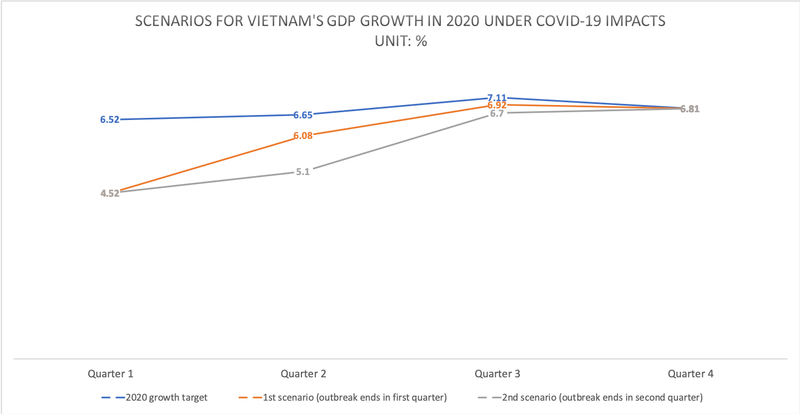Vietnam's 2020 GDP growth predicted to slow to 7-year low
Vietnam would be among four economies hardest hit by the Covid-19 outbreak, behind Singapore, Thailand and Hong Kong (China).
The Ministry of Planning and Investment (MPI) has forecast Vietnam’s GDP growth to slow to a 7-year low of 5.96% in 2020, indicating a less optimistic outlook compared to its assessment one week ago, local media reported.
| Data: MPI. Chart: Ngoc Thuy. |
Previously, the MPI predicted Vietnam’s GDP in 2020 to grow 6.09% in case the Covid-19 (nCoV) is contained by the end of the second quarter, representing a 0.7 percentage points lower than the target set by the National Assembly and nearly one percentage point compared to 2019.
The MPI suggested Vietnam would be among four economies hardest hit by the Covid-19 outbreak, behind Singapore, Thailand and Hong Kong (China).
The latest prediction of the MPI is similar to those of domestic economists.
Pham The Anh, chief economist at the Vietnam Institute for Economic and Policy Research (VEPR), told VnExpress that Vietnam’s economic growth is predicted to be shaved off by one percentage point, while ANZ predicted a decrease of 0.8 percentage points in the first quarter due to the epidemic.
The MPI also estimated Chinese arrivals coming to Vietnam would decline by 2.3 million if the outbreak is controlled by the end of the second quarter, while those from other countries are likely to decrease between 50% and 60%.
“As Chinese tourists spend an average of US$743.6 each, and international tourists of US$1,141, a loss of US$5 billion would be incurred if the epidemic persists to the end of June,” said the MPI in its report.
Preliminary assessment from the Vietnam Tourism Advisory Board (TAB) said the damage in the first quarter could be up to US$7 billion and exceed US$15 billion until the end of the second quarter.
With tourism under pressure from the outbreak, the aviation industry is set to face a similar fate. Before the epidemic, 11 Chinese airlines conducted 240 flights per week to Vietnam, while Vietnam Airlines, Jetstar Pacific and Vietjet operated 72 flight routes to 48 destinations in China with 401 flights per week.
In addition to tourism and aviation, Vietnam’s agricultural sector with high dependence on the Chinese market is facing numerous difficulties.
KB Securities said as consumption in China shrinks due to the outbreak, Chinese imports of goods and products from other countries would be set to decline. Meanwhile, China is Vietnam’s main export market for agricultural products as its imports Vietnamese goods worth nearly US$6 billion, accounting for 35% of Vietnam’s total exports of agricultural products.
In 2019, Vietnam recorded a trade deficit of nearly US$34 billion from China, importing largely phone and electronic parts, and input materials for textile and footwear production. With heavy dependence on input materials from China, Vietnam's manufacture is set to face a major impact from the outbreak.
A survey conducted by the National Private Economic Development Research Board revealed many enterprises could maintain operation for one more week before running out of input materials.
Cash injection not an answer
Vietnam, however, is not the only country facing pessimistic outlook amid the outbreak of the Covid-19. On the global stage, many countries are using stimulus packages to mitigate the negative impacts. China has rolled out a US$174-billion bailout package, comprised of US$22-billion injection into Chinese markets to prevent the country’s stocks and currency from falling. Other countries also took a slew of measures to shore up their financial markets.
VEPR expert Pham The Anh said in case of Vietnam, monetary easing would not be feasible due to differences in the structure of economic growth.
A stimulus package would not boost the number of Chinese tourists coming to Vietnam, produce more agricultural goods or provide sufficient input materials for local enterprises, Anh added.
In addition, monetary easing would put upward pressure on inflation, which has been on the rise since the end of 2019 due to African swine fever.
Instead of using monetary policy, Anh said Vietnam should find ways to diversify revenues and pursue a more sustainable economic growth model.
Another solution is to waive visa for tourists from European countries and other important markets such as New Zealand, Canada, to relieve pressure from a decline in the number of Chinese tourists.
As many enterprises are facing difficulties, there should be more supports from the banking system and tax reduction for the business community.













